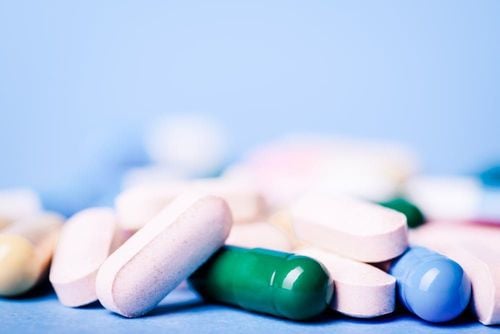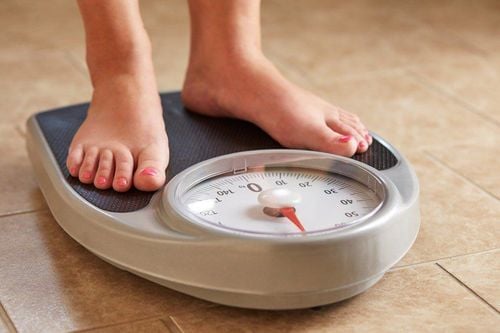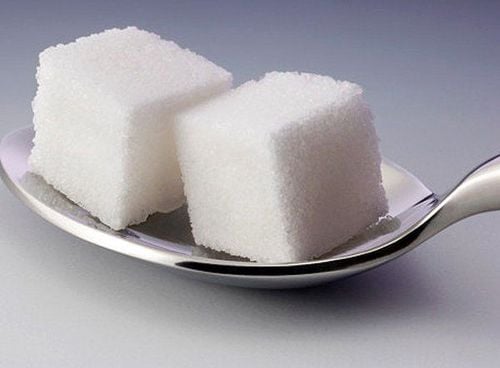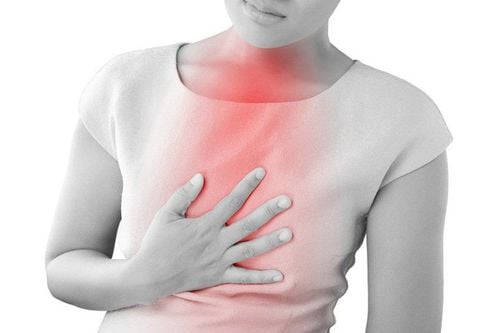This is an automatically translated article.
There are many medical reasons for being underweight. Before performing weight gain, you should check if the weight is suitable for your height or medical problems. Once you've figured out what's causing you to lose weight, your doctor or dietitian will advise you to change your diet, exercise, and rest.
1. What does being underweight really mean?
Underweight is defined by a body mass index (BMI) below 18.5. This parameter is estimated to be less than the body mass required to maintain optimal health. Conversely, when BMI over 25 years old is considered overweight and BMI over 30 years old is considered obese. However, with the BMI scale, only an overview of weight and height can be assessed and it does not calculate or represent the body's muscle mass status.
Some people are born very thin but their body is still healthy. Being underweight according to your BMI doesn't necessarily mean you have a health problem. For example: underweight is about 2-3 times more common in girls and women than in men.
2. Health consequences of being underweight
Obesity is the world's biggest health problem. However, being underweight can also have adverse effects on health. According to a study conducted, the association between being underweight and the risk of premature death was 140% higher in men and 100% in women. Meanwhile, obesity was linked to a 50% higher risk of premature death, suggesting that being underweight could be even worse for health.

Thiếu cân có thể ảnh hưởng tới sức khỏe tệ hơn béo phì
Being underweight can also decrease your immune function, increase your risk of infections, lead to osteoporosis and fractures, and cause fertility problems. Furthermore, underweight people who are more likely to experience weight loss may experience age-related muscle loss and may be more at risk for dementia.
3. Some factors cause underweight
Unhealthy weight loss is sometimes caused by a number of medical conditions including:
Eating disorders with anorexia nervosa, a serious mental disorder. Thyroid problems: Having an overactive thyroid gland (hyperthyroidism) can boost metabolism and cause unhealthy weight loss. Celiac disease of which gluten intolerance is the most severe. Most people with celiac disease don't know they have the disease ( 10Trusted Source ). Diabetes: Having uncontrolled diabetes (mostly type 1) can lead to severe weight loss. Cancer: Cancerous tumors burn large amounts of calories, causing the patient to lose a lot of weight. Infections: Several infections can cause someone to be severely underweight, including parasites, tuberculosis, and HIV/AIDS.
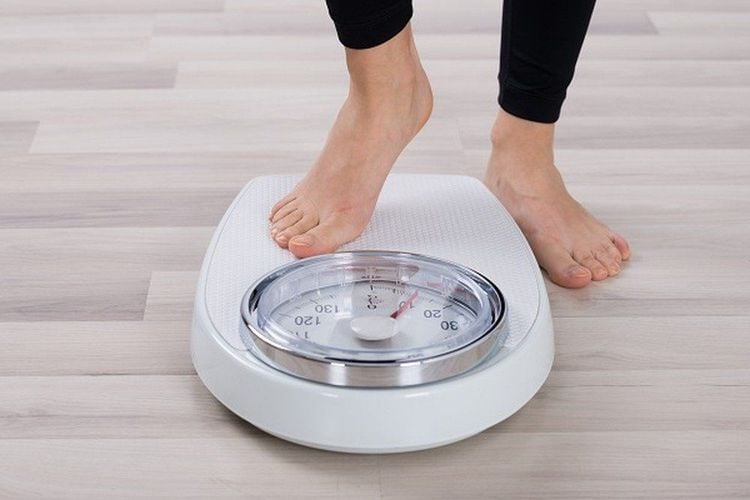
Tình trạng giảm cân không lành mạnh đôi khi còn do một số điều kiện y tế
4. How to gain weight healthy
You want to make the process of gaining weight, it is important that you do it the right way. This process is done using mostly healthy foods even if you are trying to gain weight. Diets for thin people will likely provide more calories than the body's energy needs.
A lot of people are at a normal weight but have type 2 diabetes, heart disease and other health problems often associated with obesity. Therefore, choosing good foods and following a healthy lifestyle are essential for the effective weight gain process.
5. How to determine calorie needs
If you want to gain weight slowly and steadily, aim for 300–500 calories more than you burn each day according to the spreadsheet. If you want to gain weight fast, aim for an energy requirement of 700 – 1,000 calories above your maintenance level. However, this need can vary by several hundred calories per day, depending on the specific conditions of each person.
6. Diet and exercise to gain weight
6.1. Eat plenty of protein Protein nutrition is quite important for healthy weight gain. Muscle is made up of protein, and without protein most of those extra calories could end up as body fat. Studies show that during periods of overfeeding, a high-protein diet causes many of the extra calories to be converted into muscle.
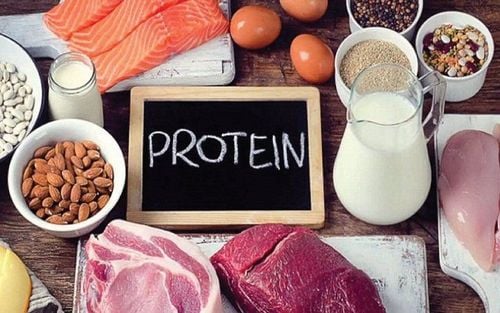
Protein là thành phần dinh dưỡng quan trọng để cơ thể tăng cân khỏe mạnh
However, protein can be a double-edged sword. It also keeps you full for longer, which can significantly reduce your hunger and cravings, making it harder for you to get enough calories. The protein requirement in the daily diet can be increased to 1.5–2.2 grams of protein/kg body weight.
Protein-rich foods of animal and plant origin include: meat, fish, eggs, many dairy products, legumes, nuts and others. Protein supplements such as whey protein can also help with weight gain.
6.2. Load more Carbs and Fat When losing weight, you will usually limit foods containing carbs and fats. But to gain weight, you need these nutrients. Eating more high-carb and high-fat foods will help you gain weight better.
Intermittent fasting is helpful for weight loss and health improvement but can make it difficult to eat enough calories to gain weight. You need to ensure that you eat at least three meals a day and try to include energy-rich snacks whenever possible.
6.3. Eat energy-dense foods and use sauces and condiments It's important for a weight-gaining diet to eat mostly whole, single-ingredient foods.
Furthermore, using more seasonings, sauces and condiments can help with this. Food that makes you feel good will make it easier for you to eat more than you normally need.
Also, try to focus on choosing energy-rich foods as much as possible.
6.4. Lifting heavy weights and improving body strength In the matter of weight management, diet and exercise to gain weight have always been said to be important and indispensable factors in either of these processes. The excess calories will go to the muscles instead of just the fat cells and will be accomplished with weightlifting exercises.
In addition, you should consult your doctor if you have bone problems or any medical problems. For example, you can do light cardio - mainly focusing on weights. Along with doing some cardiovascular exercise is good to improve fitness and health.

Cần cân đối giữa chế độ ăn và tập luyện để cải thiện sức mạnh của cơ thể
7. 10 other tips to help you gain weight
Combining high calorie intake with heavy resistance training are the two most important factors for weight gain. However, there are some other ways that can help you gain weight faster:
Do not drink water before meals, which can make you full and make it difficult to get enough calories. Eat more often, use multiple meals a day with a bedtime snack Drink whole milk for extra high-quality protein and calories. Use weight gainer. Use a larger serving plate. Add cream to your coffee for extra calories. Eat protein first and vegetables last.
8. Some problems with people who have difficulty gaining weight
Gaining weight can be difficult for some people. The reason may be because the body is born with a certain weight. When trying to lose or gain weight, your body counteracts the changes by regulating your hunger and metabolic rate.
When you eat more calories in your diet and gain weight, your body responds by reducing your appetite and increasing your metabolism. This is largely mediated by the brain, as well as by weight-regulating hormones such as leptin.
Any questions that need to be answered by a specialist doctor as well as customers wishing to be examined and treated at Vinmec International General Hospital, please contact the Website for the best service.
Please dial HOTLINE for more information or register for an appointment HERE. Download MyVinmec app to make appointments faster and to manage your bookings easily.
References: healthline.com, nhs.uk




